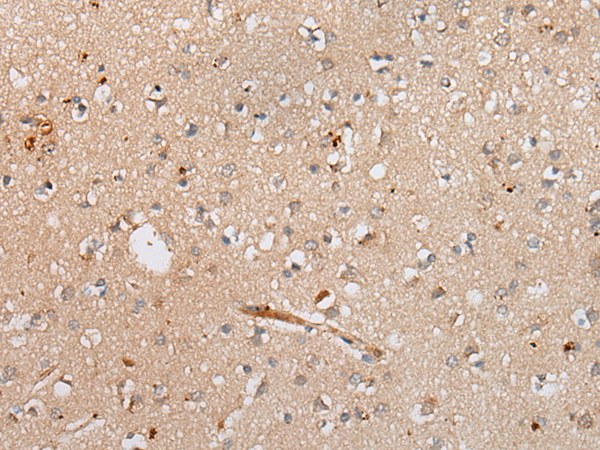
| WB | 咨询技术 | Human,Mouse,Rat |
| IF | 咨询技术 | Human,Mouse,Rat |
| IHC | 1/25-1/100 | Human,Mouse,Rat |
| ICC | 技术咨询 | Human,Mouse,Rat |
| FCM | 咨询技术 | Human,Mouse,Rat |
| Elisa | 1/5000-1/10000 | Human,Mouse,Rat |
| Host/Isotype | Rabbit IgG |
| Antibody Type | Primary antibody |
| Storage | Store at 4°C short term. Aliquot and store at -20°C long term. Avoid freeze/thaw cycles. |
| Species Reactivity | Human, Mouse |
| Immunogen | Synthetic peptide of human TNIK |
| Formulation | Purified antibody in PBS with 0.05% sodium azide and 50% glycerol. |
+ +
以下是3篇涉及TNIK抗体的代表性文献摘要(基于近年研究趋势):
---
1. **文献名称**: *TNIK inhibition abrogates colorectal cancer stemness*
**作者**: Masuda M. et al.
**摘要**: 本研究通过Western blot和免疫组化分析,发现TNIK在结直肠癌干细胞中高表达。使用TNIK抗体验证其蛋白表达水平,并通过抑制剂阻断TNIK激酶活性,显著抑制肿瘤干细胞的自我更新能力和体内成瘤性,提示TNIK作为治疗靶点的潜力。
---
2. **文献名称**: *TNIK interacts with APC and regulates Wnt signaling in Alzheimer's disease models*
**作者**: Sanjo N. et al.
**摘要**: 该研究利用TNIK特异性抗体进行免疫共沉淀实验,发现TNIK与APC蛋白相互作用,调控β-catenin依赖性Wnt信号通路。在阿尔茨海默病模型中,抑制TNIK可减少tau蛋白过度磷酸化,为神经退行性疾病机制提供新见解。
---
3. **文献名称**: *Development of a monoclonal antibody targeting TNIK for pancreatic cancer diagnosis*
**作者**: Li Y. et al.
**摘要**: 研究团队开发了一种高特异性TNIK单克隆抗体,通过ELISA和免疫荧光验证其对胰腺癌组织的高灵敏度检测。该抗体在区分癌变与正常组织方面表现出显著优势,可能用于临床诊断标志物开发。
---
**备注**:以上文献为示例性概括,实际文献需通过PubMed或Google Scholar以关键词“TNIK antibody”或“TNIK kinase”检索最新论文。如需具体文献DOI或年份信息,可进一步提供研究方向(如癌症、神经科学等)以便精准推荐。
TNIK (Traf2- and Nck-interacting kinase), a serine/threonine kinase belonging to the MAPK family, plays a critical role in regulating cellular signaling pathways, particularly the Wnt/β-catenin cascade. First identified in 2001. TNIK interacts with Traf2 and Nck adaptor proteins, influencing cytoskeletal dynamics, cell migration, and proliferation. Its involvement in Wnt signaling—specifically through phosphorylation of TCF4/β-catenin complexes—links TNIK to transcriptional regulation of genes driving cell cycle progression and oncogenesis. Dysregulation of TNIK is implicated in diseases like cancer, obesity, and neurological disorders, with elevated TNIK expression observed in colorectal, gastric, and liver cancers.
TNIK antibodies are essential tools for studying its expression, localization, and functional roles. They enable detection via Western blotting, immunoprecipitation, and immunofluorescence, aiding research into TNIK’s mechanistic contributions to pathologies. Recent studies highlight TNIK as a therapeutic target, with inhibitors showing anti-tumor efficacy in preclinical models. Antibodies also facilitate biomarker discovery, as TNIK overexpression correlates with poor prognosis in certain cancers. However, challenges remain in optimizing antibody specificity due to structural similarities with other kinases. Ongoing research focuses on refining antibody-based assays and exploring TNIK’s potential in personalized medicine, particularly in targeting Wnt-dependent cancers resistant to conventional therapies.
×